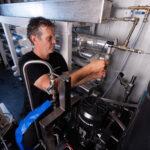Cetogenix: Building renewable futures — with no waste left behind
Each year, the world produces more than 100 billion tonnes of carbon-rich waste from food production, agriculture, sewage treatment and industrial manufacturing.
Cleantech startup Cetogenix, a 2024 KiwiNet Research Commercialisation Awards finalist, has found a way to harness the untapped potential of organic waste to generate renewable energy and other circular economy products.
The company’s Ceto-Boost™ system breaks down organic wastes and transforms them into valuable products like biomethane, fertilizers and biomaterials. Their patented process uses hydrothermal oxidation — leveraging temperature, pressure and air without any additional chemicals — to deconstruct waste with remarkable efficiency.
This novel approach reduces organic waste volumes by 95% and eliminates contaminants like microplastics and pathogens. Globally, it’s estimated Ceto-Boost™ could replace up to 12% of fossil natural gas production and cut greenhouse gas emissions by 884 million tonnes of CO2e annually.
The foundation of this innovation lies in over a decade of science and engineering research while the Cetogenix co-founders were working at Scion. They formed Cetogenix in July 2022 via a successful NZ$4.8 M capital raise with co-investment from Pacific Channel Limited, Angel HQ, Enterprise Angels, and Icehouse Ventures.
Since launching, Cetogenix has grown to a team of twelve, who complement strong domestic and international R&D and commercialisation relationships. Within one year of founding, Cetogenix scaled up to a prototype Ceto-Boost™ pilot system in Rotorua, where they still maintain a strong collaborative research partnership with Scion.
The company is initially focusing on the global municipal wastewater and agricultural biogas markets and has confirmed pilot trials with end-users in New Zealand and the United Kingdom. Maintaining application flexibility and aligning their technology development and intellectual property with evolving market needs has proven crucial for success.
With its sustainable waste-to-resource technology, Cetogenix offers a powerful solution to the world’s reliance on fossil carbon — paving the way for a cleaner, greener future.
NZ Manufacturer talks with Cetogenix CEO and co-founder Trevor Stuthridge:
How are you finding interest in your Ceto Boost system?
Our development of Ceto-Boost™ coincides with major global drivers related to energy security (i.e., finding alternatives to fossil energy, such as natural gas), circularity (i.e., better re-use and upcycling of waste streams), and climate change (i.e., adopting technologies that lower greenhouse gas emissions from source – such as organic wastes – or in supply chain – by replacing fossil carbon with bio-based alternatives).
Given that Ceto-Boost™ effectively addresses each of the elements, we have had considerable interest in our technology, especially as it is seen as a more effective solution to those of a number of potential competitors.
Where is interest coming from?
Interest is coming from both domestic and international parties in the municipal wastewater treatment, agricultural/horticultural sectors, and industrial manufacturing space. For municipal stakeholders, our capacity to eliminate solid waste disposal to landfill or via land application is of the greatest importance – and forms the basis for a significant partnership with the UK water sector.
For agricultural stakeholders, our capacity to increase biogas production of their adopted anaerobic digestion systems – whilst capturing significant value from the nutrients as replacements for synthetic fertilisers – has been compelling – and we collaborations in New Zealand, Australia and Europe in that space.
Finally, several large global corporates are working with us to help deliver their zero-carbon strategies by addressing their own requirement to better upcycle their own organic wastes from manufacturing – as well as supporting primary producers in their supply chain to adopt best practice waste-to-value opportunities.
What you are doing is a big deal; universally, cutting emissions must give you enormous pride
We are immensely proud that innovation from New Zealand has the potential to make a substantial difference to global sustainability. It has been a long journey from the original invention of the IP by the Cetogenix co-founders – and one that required us to “wait” until the market conditions aligned best with our value proposition.
What is particularly exciting is that, in a number of cases, internationally substantive end-users are reaching out to us to engage, having assessed their options and determined that Cetogenix has a unique technology offering.
This is particularly satisfying because we deliberately adopted a set of “sustainable design” principles from the very beginning in creating this technology – like the concept of “no waste left behind” – and these are being embraced by these end-users.
Are you well-funded?
Like all start-ups, we are constantly looking for investment to support our strategic direction and scale up our technology. We were very privileged to have an initial set of investors support us in 2022. We are currently raising additional investment to ensure we can accelerate our technical and commercial programs—especially important given our strong alignment to market forces.
Where would you like Cetogenix to be in five years?
We believe Cetogenix is creating the “new normal” for advanced sustainable technologies in our chosen market spaces. In five years, we hope to see a large number of our modular systems installed as retrofits into existing plants in Europe and elsewhere.
We also expect to see our technology fully integrated into new-builds via partnerships with leading waste-to-renewables companies at a global level. Overall, this will mean we are offering tangible and meaningful impacts on climate change metrics, value creation, and sustainable production of energy and biomaterials.
Whilst our own largest markets are certainly international, it would be great to see New Zealand also adopting our technology across a number of key sectors – especially agriculture – where greenhouse emission reduction, replacement of fossil-based products, and demonstrable low-carbon production are critical to their global customers.



